Pittsburgh Opera’s ‘Il Trovatore’: A Smashing Success, Let the Anvils Ring
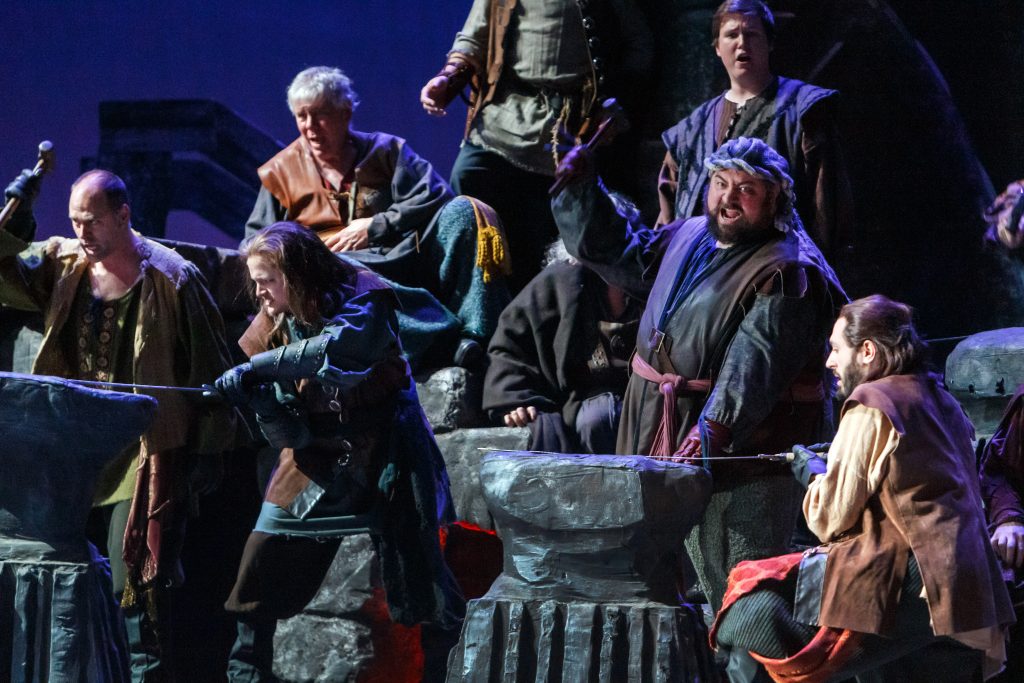
Romani villagers strike their anvils in the chorus for which ‘Il Trovatore’ is best known.
Revenge, deception with a twist of irony.
Given most any season of classic opera, there are both chestnuts and rare, yet tasty morsels to chew on. The more obscure the work, the harder is the job of the critic who must educate his reader. Fortunately for this reviewer, Pittsburgh Opera’s current production of Il Trovatore is a favorite among opera fans who adore Giuseppe Verdi’s best works. Il Trovatore was written by the Italian master in 1853, the very same year he staged La Traviata and just two years after his premiere of Rigoletto. Verdi was as hot mid-career as he was when completing his last three operas, Aida, Otello and Falstaff, two decades later. Il Trovatore (The Troubadour) is certainly one of his most emotional works, ingeniously constructed with heart-wrenching arias, dramatic duets, and a cleverly syncopated chorus. If that strikes home, this opera is perhaps best known for its “Anvil Chorus,” when the villagers, preparing to fight for their freedom, fiercely pound forged swords.
If it’s not one thing, it’s your mother. Beware!
Of course, opera is nothing if its characters are not defiant, angry, grieving or dying of––or for–– love. And Il Trovatore has all of that, and more. The four central characters of the story, set during a Castilian war in Spain (which, worry not, is hardly relevant to enjoying the plot,) are Manrico (the troubadour) who is the son of Azucena (an old Romani peasant woman), who seeks revenge for the death of her mother burned at the stake for bewitching a young heir to the royal court.
Also central to the action is Counte di Luna (commander of the ongoing war), who fights for the affection of a noblewoman, Leonora (attendant to the queen), who, despite the Count’s advances, is obsessively in love with the mysterious troubadour. Got that? Of course, like so many operas set in historic context, the back story often becomes awkward exposition, and no one principal character can express his or her emotional relevance without having petty, but elucidating contretemps with supporting characters––mistrusting attendants, doubting maids, suspicious villagers, or cynical soldiers. There is a lot to take in in the first act; fortunately, classic opera is rarely produced for modern audiences without a full plot synopsis available in the evening’s program. Also helpful, English translations of the Italian lyrics are often projected above the proscenium. Pittsburgh Opera provides both.
Bravo for vibrant voices
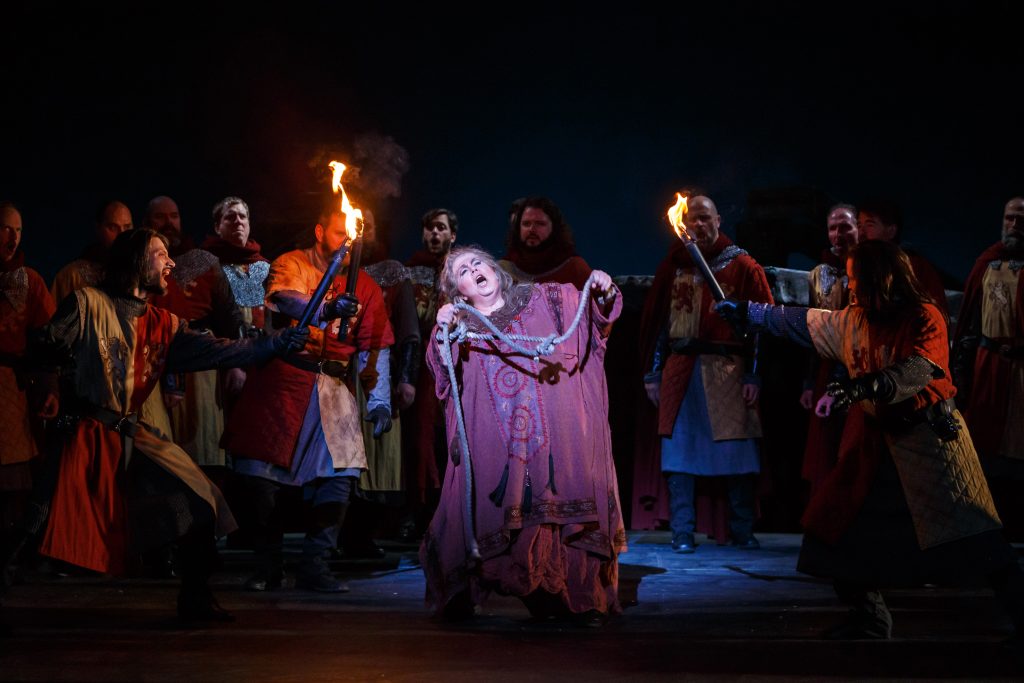
Captured to burn in a blazing pyre, Azucena (Marianne Cornetti) bemoans her fate while secretly plotting to save her son Manrico. Cornetti’s performance sets the Benedum stage on fire.
The beauty of opera is emotion expressed through song and voice, both of which are made compliant to traditional constructs of (particularly) Italian opera popularized in the mid-17th century. Marianne Cornetti, as the old Romani mother, Azucena, embraces every dramatic moment to bare her operatic soul in this exceptional performance. Mezzo-soprano Cornetti, a Pittsburgh resident and a member of the Voice faculty at CMU, is beloved internationally for her many performances in this singular role. She has performed as Azucena at the Teatro alla Scala in Milan, the Arena di Verona, Teatro Comunale in Firenze and with similar companies in Parma, Napoli, Bologna, and Rome. She has played Azucena to standing ovations in Sao Paulo, Tel Aviv, Beijing and New York City, most notably with the Metropolitan Opera. She received the same highest accolade Saturday night with the Pittsburgh Opera.
As Manrico, her son, Jonathan Burton played to exceptional applause, too. A tenor with as much gravity as a bass, Burton seemed to float on his own energy, tirelessly exceeding every challenge the demanding role requires. He must excite his soldiers to wage war, he must defy his mother to save Leonora, he must defeat Counte di Luna (yet spare his life,) he must console Azucena, and he must mourn for Leonora. It’s a lot of stagework to do, not to mention a lot of powerful lyrics to project. Burton comes out shining, even if Manrico’s fate turns the other way.
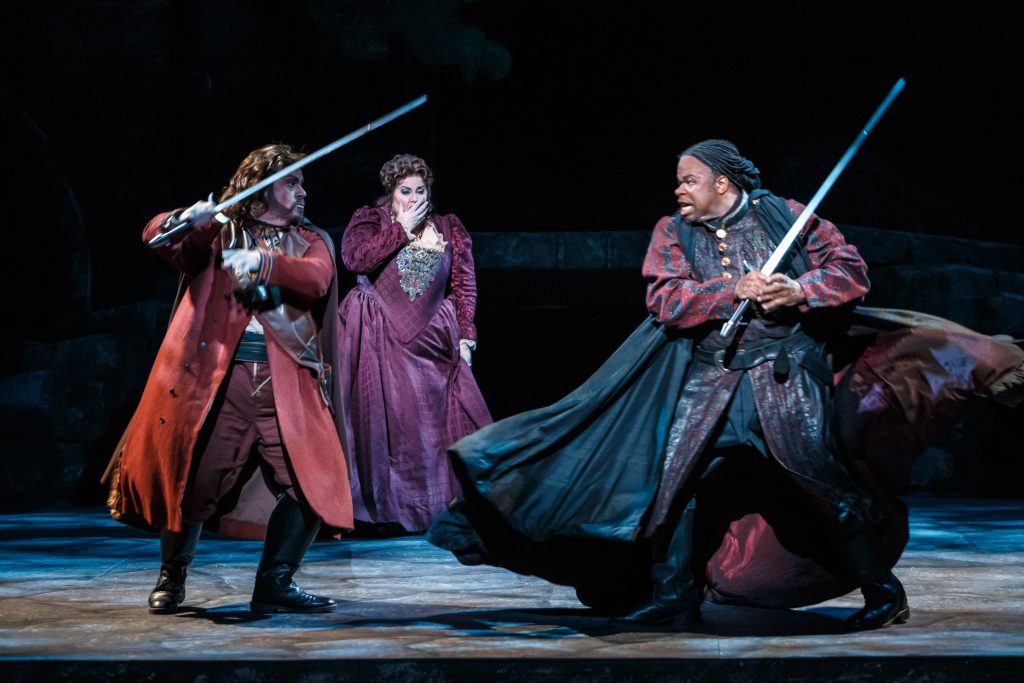
Manrico (Jonathan Burton) wages war with Counte di Luna (Lester Lynch) for the heart of Leonora ((Alexandra Loutsion.)
As Leonora, soprano Alexandra Loutsion proves great talent can derive, quite evidently, from a career not long ventured. She first debuted with Pittsburgh Opera in 2010 in The Barber of Seville, and first performed internationally in 2018. A sometime protege of Ms. Cornetti, she has performed often with the Pittsburgh Festival Opera for which Cornetti serves as Artistic Director. Loustion is a Canonsburg native, regardless of which, she has proven to be a favorite of Pittsburgh Opera, featured in more than ten productions in that past 12 years. Her performance Saturday, soaring and sincere, answers why.
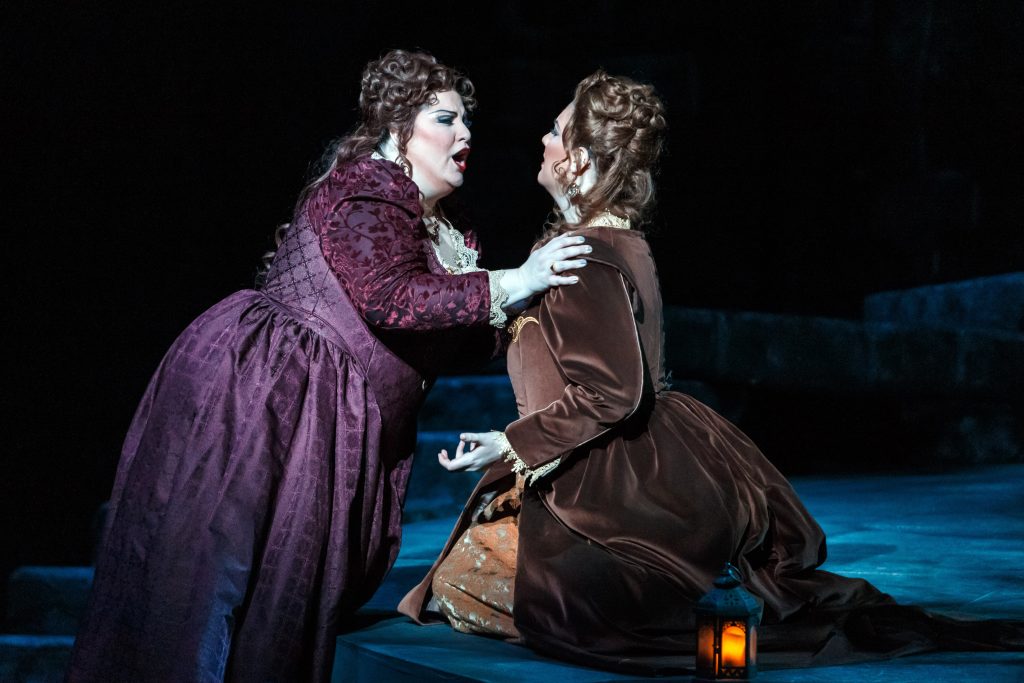
Leonora (Alexandra Loutsion) confesses her love for a mysterious troubadour to her lady-in-waiting Ines (Emily Richter.)
Certainly not least of the evening’s four principal artists is Lester Lynch as Counte di Luna. Brooding, menacing, demonstrative and fierce, Lynch made relevant every note of his powerful baritone. He, too, is internationally acclaimed for roles ranging from Porgy & Bess performed at the Teatro alla Scala in Milan to Iago in Otello staged by the Taipei Symphony Orchestra.
Of course, it seems not the least bit fair to shine the light on just four artists in a cast of well more than 45 performers. Emily Richter, as Leonora’s assistant Ines, is delightful and rewarding. And Ashraf Sewailam’s Ferrando is compelling and awe-inspiring. In fact, Pittsburgh Opera’s production of Il Trovatore does not skimp on anything. Counte di Luna commands a full army––not a mere six men representing more. Even combative Manrico’s men are many and strong. Both for the “Anvil Chorus,” performed in a mountain village, and for the rescue of Leonora from the castle convent, the stage resounds with bold voice. The costumes, provided by arrangement with the Sarasota Opera Association, and the set, provided by the New Orleans Opera Association, are remarkably and dramatically appropriate.
Of soldiers, swords and staging
As professional opera becomes more the creative domain of the featured artists––and less so that of the director––productions like this can be challenging to mount cohesively. That is to suggest that, while blocking a cast of 45 on a stage as large as the Benedum provides might be a simple matter of composition, how best to choreograph the dramatic presence of just one character on stage can create its own problems. For example, Leonora, left alone to fret the arrest of her lover offstage, seemingly spends an eternity on stage, longer still when her focus is directed elsewhere. There are many swords on stage of which gratefully few are employed in swordplay. But if swords are to be played, then play on. Likewise, timing and pacing is rarely a challenge when accompanied by an orchestra as tight as the Pittsburgh Opera Orchestra (Antony Walker, conductor.) Yet, Manrico’s demise before the closing curtain comes much too quickly. A moment to anticipate, or just a beat in which to mourn, might help.
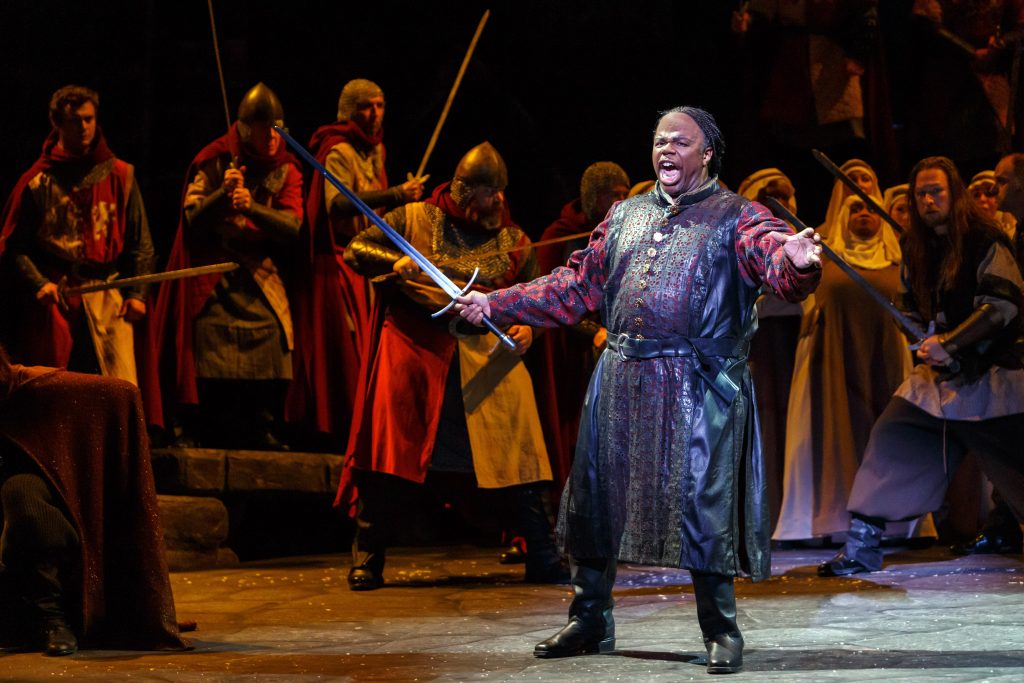
Singing swordsman Conte di Luna (Lester Lynch).
Like a horror film or a riveting Star Wars adventure, any genre of dramatic story-telling requires its audience to suspend disbelief; opera, however, asks its patrons to do much more. If soliloquies are not the norm, arias seem wholly abnormal. And operatic duets become other-worldly. But that is the fascination of classic opera. It can seem alien, remote or all together produced in a different time or dimension. Which is exactly why Pittsburgh Opera’s production of Il Trovatore should not—and must not––be dismissed by those who think they “don’t get” opera. This is one production “to get.”
High notes
Conductor Antony Walker led his orchestra––inclusive of four bass, ten-plus violins, four viola, five cello, flute, oboe, piccolo, clarinet, bassoon, horn, trumpet, tuba, trombone, timpani percussion, organ and harp––in fine form. Likewise, Chorus Master Mark Trawka produced exceptional ranges from a chorus of eight soprano, nine alto, eleven tenor, and twelve bass voices. Stage direction is by Daniel Rigazzi, set design by G. Alan Rusnak, costume design by Howard Tsvi Kaplan, and lighting design by Cindy Limauro. Cindy Knight is stage manager, James Geier wig and makeup, and Tonya R. Lynn fight director.
Tickets for Il Trovatore are at very reasonable prices and are available for performances now through April 2 at the Pittsburgh Opera website. Benedum Center, 237 7th Ave., Cultural District.
Photo Credit: David Bachman Photography for Pittsburgh Opera.
Prentiss Orr writes about theater for Entertainment Central. He has worked in theater management and has also taught theater. His latest book, The Surveyor and the Silversmith, is a history of white settlement, genocide, and land speculation in Western Pennsylvania.
Share on Social Media
Follow Entertainment Central
Latest Stories
Sign up for the EC Newsletter







